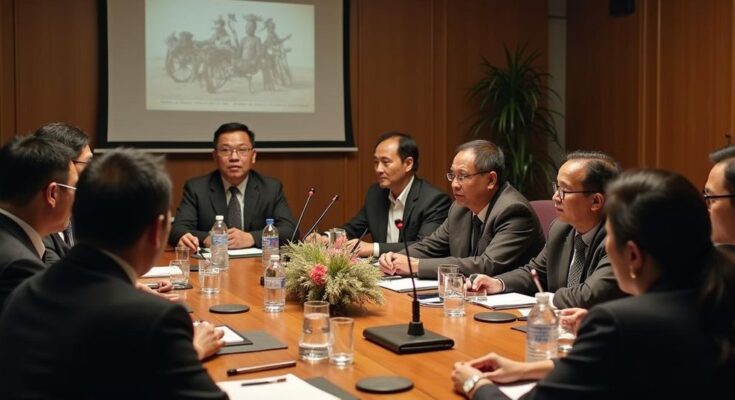The International People’s Tribunal in The Hague found Indonesia culpable for crimes against humanity during the 1965-1966 mass killings, which left between 500,000 and one million dead. The tribunal cited numerous human rights violations and urged the Indonesian government to apologize, investigate responsible parties, and provide reparations to victims.
On July 20, 2023, the International People’s Tribunal in The Hague issued a landmark ruling holding the Indonesian government accountable for crimes against humanity during the mass killings of 1965-1966, which resulted in the deaths of an estimated 500,000 to one million individuals suspected of being affiliated with the Indonesian Communist Party (PKI). This purge, facilitated by the military, led to the ascent of the New Order regime under former President Suharto. The tribunal’s conclusive statement identified ten serious human rights violations committed by the state, including acts of genocide against PKI members, their supporters, and individuals aligned with President Soekarno, as well as members of the Indonesian National Party (PNI). Presiding Judge Zak Yacoob emphasized the state’s accountability, declaring, “The State of Indonesia is responsible for and guilty of crimes against humanity consequent upon the commission and perpetration, particularly by the military of that state through its chain of command, of the inhumane acts.” Beyond mass executions, the tribunal documented a range of atrocities, including enslavement, torture, forced disappearances, sexual violence, and the dissemination of false propaganda, all part of a systematic assault against the PKI and its affiliates. Judge Yacoob reiterated that the state failed to prevent or punish these heinous acts, despite some being attributed to independent local actions. He affirmed, “To the extent that some crimes were committed independently of the authorities, by so-called ‘spontaneous’ local action, this did not absolve the State from the obligation to prevent their occurrence and to punish those responsible.” In its closing remarks, the tribunal urged the Indonesian government to issue a formal apology to all victims and their families, investigate and prosecute those culpable, and provide reparations to survivors. Furthermore, it called for the Attorney General to act on recommendations made by the National Commission of Human Rights in 2012 regarding grave violations of human rights during these events. The tribunal particularly emphasized the necessity for the rehabilitation of surviving victims, the prevention of further persecution, and the protection of their rights as stipulated by both international and national laws.
The events surrounding the mass killings in Indonesia from 1965 to 1966 were instigated by anti-communist sentiment and resulted in widespread violence against those perceived to be associated with the Indonesian Communist Party (PKI). This period marked a significant turning point in Indonesian history, leading to the establishment of Suharto’s New Order regime, characterized by authoritarian governance. These killings have remained a contentious and unresolved issue in Indonesian society, prompting calls for accountability and justice for the victims and survivors. The recent ruling by the International People’s Tribunal attempts to address these long-standing grievances and hold the state accountable for its role in these atrocities.
The International People’s Tribunal’s ruling marks a pivotal moment in acknowledging the atrocities committed during the 1965-1966 mass killings in Indonesia. By declaring the Indonesian state guilty of crimes against humanity, the tribunal has set a precedent for addressing past human rights violations and has called for systemic changes, including apologies, investigations, and reparations for the victims. This ruling not only seeks justice for the survivors but also underscores the importance of historical accountability in the pursuit of national reconciliation and human rights protection in Indonesia.
Original Source: jakartaglobe.id




